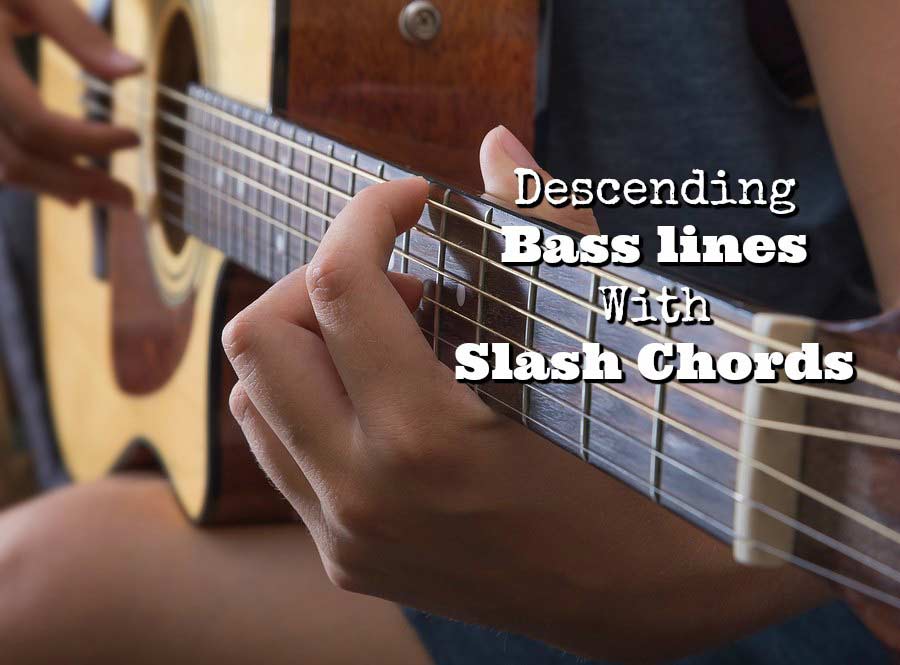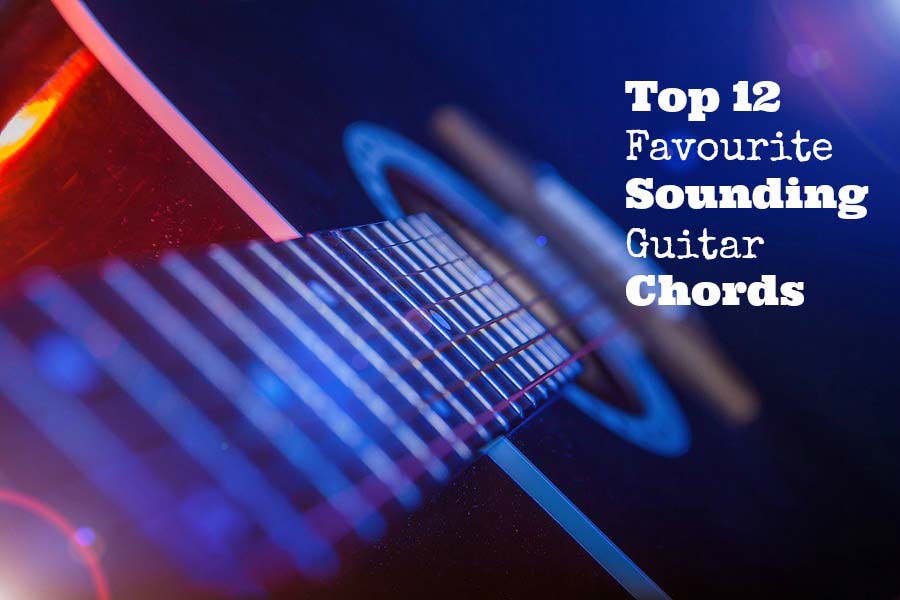September 4, 2023 by Klaus Crow

Slash chords can be used to incorporate descending and ascending bass lines into your playing. It gives the listener the impression that a bass player is playing along with your guitar. You have two sounds for the price of one.
A slash chord is a chord that includes a slash symbol like D/F# (hence the name “slash chord”). A slash chord specifies a bass note other than the root. The bass note is the lowest sounding note in the chord and is shown at the right of the slash. While normally the root note of the chord is the bass note, now the note at the right of the slash is the bass note.
D/F#
The D major chord with a F# note in the bass, is written as D/F# which is pronounced as “D slash F sharp”. The D/F# chord is usually played between G and Em. Let’s take a look why that is.
The slash chord is often applied in a I-V-vi chord progression, where the V chord is the slash chord and used as a passing chord. For example if you play a I-V-vi progression in the key of G you get: G – D – Em.
For the V chord (in this case a D chord) we use the third note of the chord as the lowest note / bass note. (See chord construction on how to find notes in a chord) The third note of a D chord is “F#” (D major scale = D E F# G A B C# D). The progression becomes: G – D/F# – Em. Playing the chords like this will create a descending bass line, also known as a walkdown. The bass notes of the three chords are G – F# – E, which creates the descending bass line.
Here’s a typical D/F# chord progression in 4/4 time:
| G | G D/F# | Em | Em |
C/B
C/B is another example of a slash chord used in a walkdown, but not in a I-V-vi progression. The second chord in the progression just remains a C chord, but now with the B note in the Bass. It’s played between the chords C and Am. So you get C – C/B – Am. The notes of the descending bass line are C – B – A.
C/B chord progression in 4/4 time:
| C | C C/B | Am | Am |
D/C#
The D/C# is often used between chords D and Bm. This slash chord is a bit harder to play because you have to reach with your pinky all the way to the A-string 4th fret. Just keep practicing. It gets better. And eventually you’ll nail it.
D/C# chord progression in 4/4 time:
| D | D D/C# | Bm | Bm |
Descending Bass Line Chord Progression
A somewhat longer chord progression with a descending bass line is
D – D/C# – Bm – Bm/A – G – D/F# – Em – A (See the chords below)
The bass notes in this chord progression are: D – C# – B – A – G – F# – E – A. You can see the notes are following a descending pattern from high to low.
Play the chord progression with two down strums on each chord consistently all the way through. Make sure you accentuate/hit the bass note on the first down strum so you hear the descending bass line clearly while your strumming the progression and hit the higher strings on the second strum.
Now and then you’ll see this chord progression appear in popular songs. You can apply it to the song Better together by Jack Johnson using the capo on the 3rd fret. Listen to the chord progression of the verse right after the intro.
Here’s the chord progression in 4/4 time:
| D D/C# | Bm Bm/A | G D/F# | Em A |
Assignments:
– Practice every chord thoroughly. Make sure every note sounds clean and clear.
– First practice the progressions slowly, then gradually build up speed and make the transition sound smooth.
– Pick a song with chords| G | G | Em | Em | now play | G | G D/F# | Em | Em |
– Pick a song with chords| C | C | Am | Am | now play | C| C C/B | Am | Am |
– Implement slash chords in your own songs and use them to spice things up a bit.
– Practice the chord progression in the opposite direction and you’ll have an ascending bass line. | Em | Em D/F# | G | G | Sounds pretty cool too!
Have an Awesome Weekend!





 There are so many beautiful sounding chords you can play on the guitar. It’s one of the triggers that makes me want to grab my guitar daily. I love sitting in my comfty chair, strumming a couple of those chords, fiddling around with the sounds, adding or lifting some fingers here and there, and see where it takes me and how it evolves into a piece of music.
There are so many beautiful sounding chords you can play on the guitar. It’s one of the triggers that makes me want to grab my guitar daily. I love sitting in my comfty chair, strumming a couple of those chords, fiddling around with the sounds, adding or lifting some fingers here and there, and see where it takes me and how it evolves into a piece of music.

